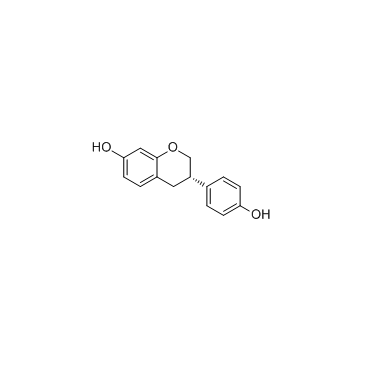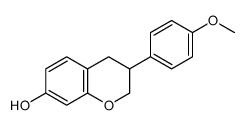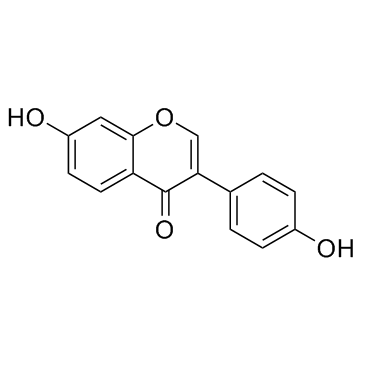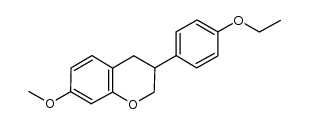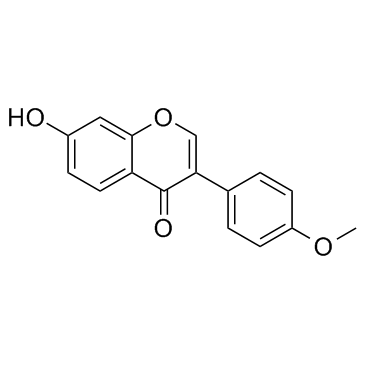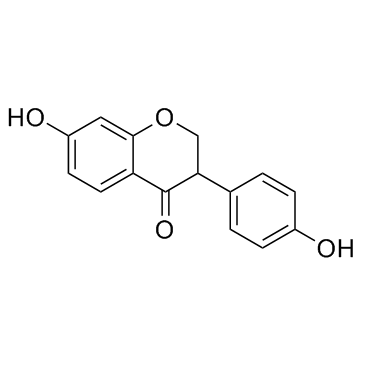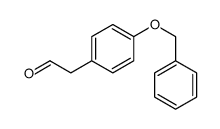531-95-3
| Name | Equol |
|---|---|
| Synonyms |
(3S)-3-(4-Hydroxyphenyl)chroman-7-ol
(3S)-3-(4-hydroxyphenyl)-3,4-dihydro-2H-chromen-7-ol Equol (3S)-3-(4-Hydroxyphenyl)-7-chromanol (S)-Equol EINECS 208-522-2 (-)-Equol 4',7-DIHYDROXYISOFLAVAN (S)-3-(4-Hydroxyphenyl)chroman-7-ol R,S-EQUOL MFCD00200962 7,4'-ISOFLAVANDIOL 4',7-ISOFLAVANDIOL (-)-(S)-Equol |
| Description | (-)-(S)-Equol is a high affinity ligand for estrogen receptor β with a Ki of 0.73 nM. |
|---|---|
| Related Catalog | |
| Target |
Human Endogenous Metabolite |
| In Vitro | (-)-(S)-Equol shows the greatest affinity for ERβ (Ki=0.73±0.2 nM), whereas its affinity for ERα (Ki=6.41±1 nM) is relatively poor[1]. (-)-(S)-Equol inhibits the growth of LnCaP, DU145 and PC3 human prostate cancer cell lines. (-)-(S)-Equol causes cell cycle arrest in the G2/M phase in PC3 cells by down regulating cyclin B1 and CDK1 and upregulating CDK inhibitors (p21 and p27), as well as inducing apoptosis by upregulating Fas ligand (FasL) and the expression of pro-apoptotic Bim. (-)-(S)-Equol increases the expression of FOXO3a, decreases the expression of p-FOXO3a and enhances the nuclear stability of FOXO3a. (-)-(S)-Equol also decreases the expression of MDM2, which serves as an E3 ubiquitin ligase forp-FOXO3a, thus preventing p-FOXO3a degradation by the proteasome[2]. (-)-(S)-Equol enantioselectively increases the survival of INS-1 cells presumably through activating PKA signaling. (-)-(S)-Equol might have applications as an anti-type 2 diabetic agent. In INS-1 pancreatic β-cells, (-)-(S)-Equol induces phosphorylation of cAMP-response element-binding protein at Ser 133, and induced cAMP-response element-mediated transcription[3]. |
| In Vivo | (-)-(S)-Equol inhibits the tumor growth by 43.2% and 28.4% compared to the control on day 33, suggesting that the compound is not overtly toxic[2]. |
| Cell Assay | PC3 cells are seeded in 96-well culture plates (about 5×103 cells/ well) and cultured overnight at 37°C. Next, the cells are incubated with medium containing the indicated concentrations of (-)-(S)-Equol and/or DMSO for 72hr at 37°C. The cell viability is determined by the MTT assay[2]. |
| Animal Admin | Mice: Mice are randomly divided into three groups of six mice each, and are treated by intragastric administration. The experimental groups are treated with 10 mg/kg or 20 mg/kg bodyweight of (-)-(S)-Equol (mice are treated everyday for 33 days). The control group is treated with an identical volume of 0.01ml sesame seed oil and 0.09 mL normal saline. The tumor size is examined every three days[2]. |
| References |
| Density | 1.3±0.1 g/cm3 |
|---|---|
| Boiling Point | 441.7±45.0 °C at 760 mmHg |
| Melting Point | 189-190ºC |
| Molecular Formula | C15H14O3 |
| Molecular Weight | 242.270 |
| Flash Point | 220.9±28.7 °C |
| Exact Mass | 242.094299 |
| PSA | 49.69000 |
| LogP | 2.98 |
| Vapour Pressure | 0.0±1.1 mmHg at 25°C |
| Index of Refraction | 1.645 |
| Storage condition | -20°C Freezer |
| WGK Germany | 3 |
|---|---|
| HS Code | 2932999099 |
| Precursor 7 | |
|---|---|
| DownStream 2 | |
| HS Code | 2932999099 |
|---|---|
| Summary | 2932999099. other heterocyclic compounds with oxygen hetero-atom(s) only. VAT:17.0%. Tax rebate rate:13.0%. . MFN tariff:6.5%. General tariff:20.0% |


